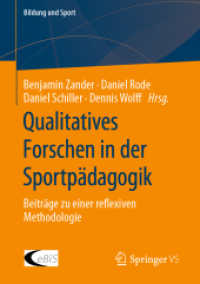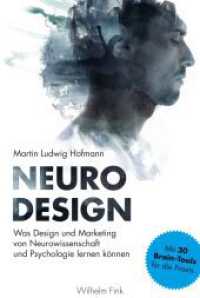- ホーム
- > 洋書
- > 英文書
- > Politics / International Relations
Full Description
Offers a groundbreaking analysis of how artificial intelligence is reshaping the dynamics of political communication and electoral competition
AI and Electoral Campaigns delivers a timely, in-depth exploration of how artificial intelligence is disrupting the foundational processes of electoral democracy. As AI technologies increasingly shape political communication, this much-needed book equips readers to identify and critically assess the emerging threats to transparency, fairness, and legitimacy in democratic elections. Drawing on real-world cases from across the globe—including Argentina, India, the U.S., and Slovakia—the authors present an empirically grounded taxonomy of AI-related threats, including deepfakes, firehosing, cognitive hacking, astroturfing, and psychographic microtargeting.
AI and Electoral Campaigns fills a critical gap in the literature by addressing not only the political and communicative dimensions of AI's role in elections, but also its legal and ethical implications. The authors propose a clear framework to evaluate the impact of AI through principles-based analysis and present comparative insights into the regulatory responses emerging in diverse jurisdictions. With a structured approach that spans historical context, threat classification, ethical considerations, and legal strategies, the book focuses on the systemic challenges AI poses to electoral integrity.
A foundational guide for navigating the next phase of democratic resilience in the digital age, AI and Electoral Campaigns:
Offers a global analysis of the new vulnerabilities and systemic risks AI introduces to democratic processes
Features technical, legal, and practical insights from experts with frontline electoral policy experience
Addresses the role of electoral management bodies (EMBs) in countering AI-driven disinformation
Includes an in-depth review of current legislative and regulatory responses from different jurisdictions
Highlights underexplored "cyberpathologies" in political discourse shaped by AI technologies
AI and Electoral Campaigns is essential reading for postgraduate and advanced undergraduate students enrolled in courses such as Political Communication, Media Law, AI and Society, and Electoral Law. It is suitable for degree programs in Political Science, Communication Studies, Law, and Public Policy, and also serves as a key reference for electoral officials, policy makers, and legal practitioners.
Contents
About the Authors viii
Prologue xi
Acknowledgments xviii
Introduction 1
Bibliography 6
Chapter 1 High-Risk Elections in a New Sociopolitical Environment 11
1.1 From Analog Campaigns to Technopolitics: The Era of High-Risk Elections 13
1.1.1 Premodern Campaigns 13
1.1.2 Modern Campaigns 15
1.1.3 Postmodern Campaigns 17
1.2 Digital Elections: A New Era for Election Campaigns 25
1.2.1 Algorithmic Communication 31
1.3 Electoral Rights and Artificial Intelligence 36
1.4 The Impact of Artificial Intelligenceon Conscious Voting Decisions 42
1.4.1 Conscious Voting and the Cognitive Wars 43
1.4.2 The Need for an Ethical Use of Artificial Intelligence in Campaigning 45
Bibliography 49
Chapter 2 Uses of Artificial Intelligence in Campaigns: Informational Dysfunctions in Political Communication 62
2.1 Artificial Intelligence at the Service of Democracy 64
2.2 Artificial Intelligence at Odds with Democracy 71
2.2.1 Disinformation and the Manipulation of Reality 77
2.2.1.1 Disinformation 77
2.2.1.2 Infoxication 79
2.2.1.3 Fake Support (Astroturfing) 83
2.2.1.4 The Hose Effect (Firehosing) 88
2.2.1.5 The Misrepresentation of Reality 89
2.2.1.6 Superficial Falsifications (Cheapfakes, Shallowfakes) 94
2.2.1.7 Deepfakes 97
2.2.2 Fragmentation, Polarization, Destabilization, and Instigation of Conflict 105
2.2.2.1 Polarizing Content 111
2.2.2.2 Radical Content 115
2.2.2.3 Extremist Content 118
2.2.3 The Rupture of Equity and Neutrality in Communication 123
2.2.4 Harassment, Discrimination, and Political Violence 131
2.2.5 Cognitive Hacking 139
2.2.5.1 Psychographic Segmentation 143
2.2.5.2 The Use of Fear 147
2.2.5.3 Bespoke Cheating 148
2.2.5.4 The Protection of Privacy 150
2.2.6 The Dispersion of Control 152
Bibliography 154
Chapter 3 The Regulatory Response 171
3.1 Preliminary Responses 173
3.1.1 The First Regulations 180
3.1.1.1 The European Union's Response 181
3.1.1.2 The Council of Europe 189
3.1.1.3 North America 190
3.1.2 Self- Regulation 193
3.2 The Response of Electoral Bodies (Brazil) 197
3.2.1 Authorization to Use Artificial Intelligence 198
3.2.2 Prohibitions on the Electoral Use of Artificial Intelligence 201
3.2.3 The Platforms' Obligations 205
3.2.4 Types of Behavior Targeted by Regulation 215
3.2.5 Effects on Freedom of Expression 224
3.2.6 Transparency and Data Protection 229
3.3 A Global, Comprehensive, and Necessary Response 234
3.3.1 First Global Responses 237
3.3.2 The Foundations of Regulation 238
3.3.3 The Central Role of Electoral Bodies 241
Bibliography 243
Index 254






